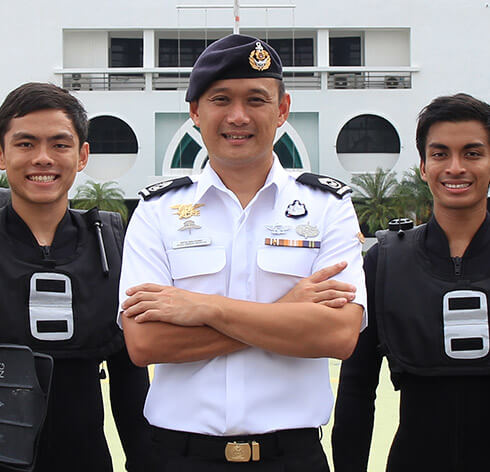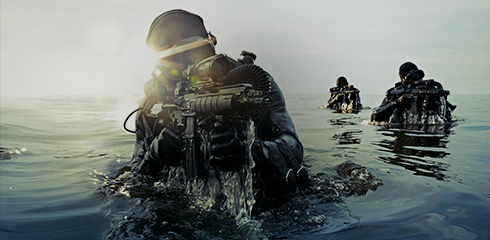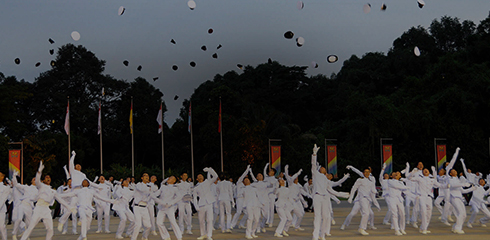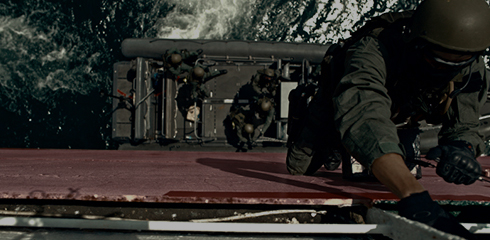It may seem like a huge leap of faith, going from studying banking and finance to becoming a Naval Diver. But even then, I knew I wanted more than just to sit in front of a computer. I wanted to serve a higher purpose.
Since I was young, I've been intrigued by dominoes. Just like how pushing a single tile could influence the other tiles to fall, I believed then, as I do now, that my small contribution to our country could have a larger positive influence on the security of our nation.
I believe that when you choose a career that you love, you'll never have to "work" a single day of your life. If you do something you don't like, there's no way you'll remain happy in that career. You won't last very long. In fact, some of my working days feel more fulfilling than my holidays.
For instance, it's very fulfilling for me when my trainees readily display Naval Diver values like honour, integrity and team spirit, even when the going gets tough. This rare display of human spirit is one of the reasons I go to work every day.
Another thing you would rarely get in the private sector is that we function like a family in the RSN. It doesn't feel like you're working with colleagues, but with friends and family.
To be honest, I initially didn't choose to be a Naval Diver. I was selected to be a Naval Diver during the mono intake while I was an NSF. But while serving my NS, I went through a lot with my fellow batch mates. In fact, we forged such strong bonds that I decided to forgo a place at a university, just so I could go through the upgrading course for NSF Naval Divers who wanted to convert to regular Naval Divers with my fellow batch boys.
At the same time, I was guided by cool trainers who reinforced the sexy aura that is associated with being a Naval Diver. This alluring sense of mystery that surrounds this elite vocation, coupled with the strong sense of camaraderie, convinced me to sign on as a Naval Diver, after completing my NS.
I grew up in a kampong that was located far away from a swimming pool, so up till the time I was selected to be a Naval Diver during my NS, I was actually a non-swimmer. I definitely had some doubts. After all, Naval Divers need to be masters of operating in the water.
The initial months were tough. But thanks to the support and encouragement of my fellow batch boys, and the guidance of my instructors, I managed to overcome my doubts. Now that I'm an instructor myself, I always lead by example and provide encouragement to my own trainees, just as my own instructors and batch boys did, so the trainees may overcome their own doubts.
The training was tough, but necessary. Whenever I am put in a challenging position in exercises or deployment, I always look back to my tough training, and tell myself that if I was able to overcome tough times before, I'd be able to do it again.
I even use this to motivate myself in my role as a father. Raising two children can be tough, but I always tell myself that I've overcome tougher obstacles.
Even if you're a strong swimmer, you will never be able to fully prepare for the Combat Diver Course. But you just have to believe in yourself, and trust that the training system will gradually prepare you to be a Naval Diver, if you set your mind to it.
This is also true with everything you do in work and in life. You can never fully prepare yourself for anything. You'll just have to take a leap of faith, and believe in your own abilities.
As mentioned earlier, there's this certain sexy aura that's associated with being a Naval Diver. The public knows the Naval Diving Unit exists, but little else is known about this elite force. So whenever I'm introduced as a Naval Diver, people are always amazed. It also helped me attract a lot of female attention back in my younger days; something no young man would complain about.
I also like the sense of adventure that comes with being a Naval Diver. It is a unique combination of adrenaline and a passion for precision. Back when I was in the Special Warfare Group, I had the opportunity to do a lot of exciting exercises and missions that involved everything from parachuting to complex dives. More importantly, I like that I'm embarking on this adventure with a very close-knit team. In short, being a Naval Diver doesn't feel like work at all.
One defining moment has got to be graduating as a Special Forces trooper. The training, which involves a local and overseas phase, is much tougher than the Combat Diver Course. But I was determined to succeed. Graduating as a Special Forces trooper allowed me to join the exciting Special Warfare Group, which was where my passion for my job grew.
Another defining moment was when I became the first Naval Diver to top the Chief Petty Officer Course. For me, it wasn't just a personal achievement. It also gave me great pride to represent the Naval Diving Unit well.
A mission I'm proud to have been a part of is Operation Flying Eagle in 2005. We provided aid to Banda Aceh after it was hit by the 2004 Boxing Day Tsunami. I was involved in ship security on vessels that were delivering vital supplies to the affected areas. Being involved in such a noble mission is a life experience that I'll never forget.
I was also involved in SAF's efforts to combat piracy along the Gulf of Aden, as part of Combined Task Force 151, where I boarded crafts suspected of conducting piracy. Contributing to this international counter-piracy effort brings me immense pride.
During the Iraq reconstruction efforts, I was part of the boarding force that checked and cleared oil tankers heading towards the Al Basrah Oil Terminal. It was a meaningful mission, as this oil terminal contributed to about 80% of the nation's GDP. I'll never forget when a grateful senior military leader of the Iraqi forces told us that, "Singapore is a small nation with a lion's heart." It made me feel proud that I was able to fly Singapore's flag proudly.
In life, wealth can be measured in different ways. You can measure it in monetary terms, or in terms of life experiences. Money comes and goes, but life experiences stay with you. I don't think that there's any other career out there that will enrich you with as many life experiences as you'll get with being a Naval Diver in the RSN.
Finally, always believe in yourself. Any limitations that you think you may have are just perceived limitations. Remember that if others before you can do it, there's no reason you can't.









